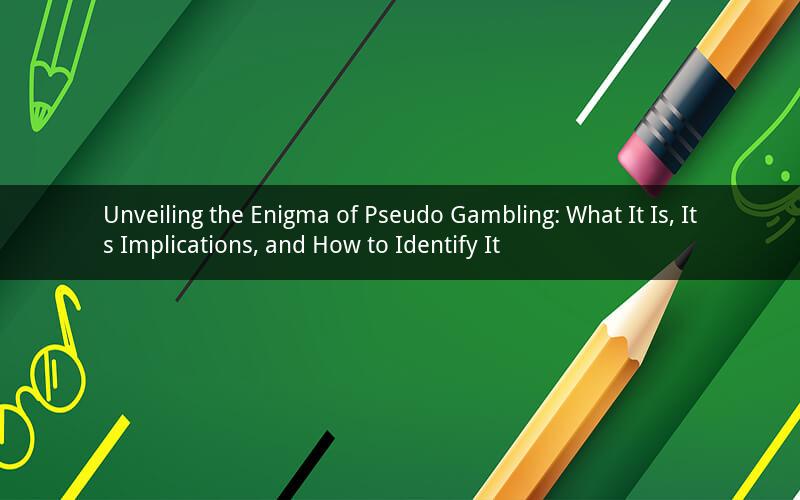
Introduction:
Pseudo gambling, a term often misunderstood and underrepresented in the gaming world, refers to an activity that resembles gambling but lacks the element of real money or material gain. While it may seem harmless, pseudo gambling can have profound psychological and emotional effects on individuals. This article delves into the intricacies of pseudo gambling, its characteristics, and how to identify it.
1. Understanding Pseudo Gambling:
Pseudo gambling, also known as gamblification or simulated gambling, is a form of play that mimics the structure and gameplay of real gambling but does not involve real money. It can be found in various platforms, including online games, mobile apps, and even certain social media platforms. The main objective of pseudo gambling is to provide entertainment and excitement, rather than the prospect of winning money.
2. Characteristics of Pseudo Gambling:
a. Lack of Real Money Involvement: Pseudo gambling does not require real money or financial transactions. Instead, players often use virtual currency, points, or tokens to participate in the game.
b. Gamified Gameplay: Pseudo gambling incorporates elements of chance, skill, and risk, similar to real gambling. This includes random number generators, luck-based outcomes, and various game mechanics.
c. Psychological Rewards: Pseudo gambling often triggers the same psychological rewards as real gambling, such as the release of dopamine and the feeling of achievement.
d. Potential for Addiction: Despite lacking real money, pseudo gambling can lead to addiction, as players may become fixated on the game and its rewards.
3. Implications of Pseudo Gambling:
a. Psychological Impact: Pseudo gambling can have similar psychological effects as real gambling, including anxiety, stress, and mood swings. It may also lead to problem gambling behaviors, such as chasing losses or becoming obsessed with the game.
b. Social Consequences: Pseudo gambling can strain relationships, as individuals may prioritize the game over family, friends, and work responsibilities.
c. Legal and Ethical Concerns: In some cases, pseudo gambling may be considered unethical or illegal, particularly when it involves deceptive practices or targeted at vulnerable populations.
4. Identifying Pseudo Gambling:
a. Look for Gamified Gameplay: Pseudo gambling often features games with elements of chance, skill, and risk, similar to real gambling.
b. Check for Virtual Currency or Tokens: If a game requires players to use virtual currency or tokens instead of real money, it may be pseudo gambling.
c. Consider the Psychological Impact: If a game triggers negative psychological effects, such as anxiety or obsession, it may be pseudo gambling.
d. Be Aware of Marketing Techniques: Pseudo gambling games may use persuasive marketing techniques to encourage players to engage more frequently.
5. Related Questions and Answers:
Q1: Is pseudo gambling addictive?
A1: Yes, pseudo gambling can be addictive, as it triggers the same psychological rewards as real gambling. However, the level of addiction may vary depending on the individual and the game's design.
Q2: How can I tell if a game is pseudo gambling?
A2: You can identify pseudo gambling by looking for gamified gameplay, the use of virtual currency or tokens, and the potential for negative psychological effects.
Q3: Can pseudo gambling lead to real gambling problems?
A3: Yes, pseudo gambling can increase the risk of developing real gambling problems, as it may desensitize individuals to the risks associated with gambling.
Q4: Is pseudo gambling legal?
A4: The legality of pseudo gambling varies depending on the jurisdiction. In some cases, it may be considered legal, while in others, it may be unethical or illegal.
Q5: How can I prevent addiction to pseudo gambling?
A5: To prevent addiction to pseudo gambling, it's essential to be aware of the potential risks, set limits on your gameplay, and seek support if you feel you are becoming addicted.